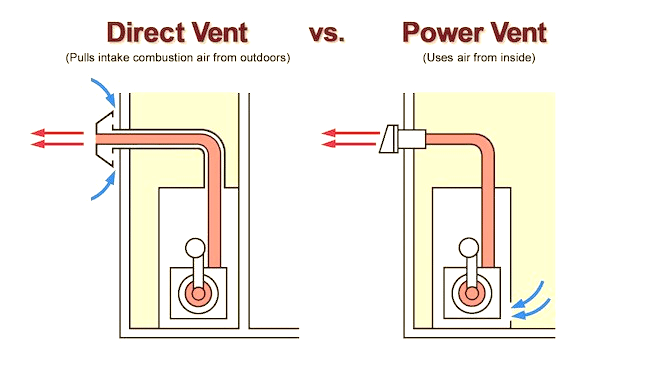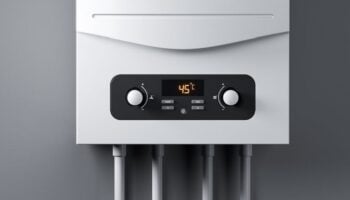We've independently reviewed this article to make sure it's as accurate as we can make it.
To find out more about our article creation and review process, check out our editorial guidelines.
There are all kinds of water heaters out there – it can be confusing to know which type would suit your home best.
A direct vent water heater is a gas-powered water heater. It sucks in outdoor air, uses it for combustion, heats up your water, and vents the exhaust gases out through your chimney.
Need to know more? Here’s what you’ll learn in this article:
- What a direct vent water heater is, and what’s it for
- How it differs from a power vent water heater
- Direct vent water heater pros and cons
- How to know if it’s the kind of water heater for you
- How much they typically cost
Ready? Then let’s dive in.
What is a Direct Vent Water Heater?
A direct vent water heater is a type of gas water heater. It works by combustion, that is, by “burning” a natural gas or propane fuel.
This combustion, in turn, heats your water.
Direct vent water heaters are really helpful in spaces where there’s not enough ventilation.
Why?
Because it draws air from the outside of your home instead of inside, and it uses this outside air for combustion to occur.
Direct Vent vs. Power Vent Water Heaters
Sometimes, people mistake direct vent water heaters for power vent units. And vice versa.
After all, they both have the word ‘vent’ in them.
Well, there are some basic differences.
The difference in terms of combustion air source:
- A direct vent unit draws combustion air from outside your home.
- A power vent unit draws combustion air from inside your home.

Direct Vent vs. Power Vent Water Heater. Difference in terms of combustion air source. Image Credit: SupplyHouse.com
The difference in terms of venting direction:
- A direct vent unit directly vents out the exhaust gases vertically. Straight to your vertical vent or chimney. It’s also called the standard vent water heater.
- Meanwhile, a power vent unit vents out the exhaust gases horizontally. Plus, it needs extra power to do so.
Where does the power vent water heater get this extra power?
Short answer: a blower motor. Simply, you can call it a fan.
This fan pushes the gases through horizontal vent pipes.
By the way, this blower is typically located at the top of the power vent water.
Are there other key differences?
Here’s one, and it’s an easier answer.
Difference in terms of venting pipe:
- A power vent water heater exhausts the gases or fumes through a PVC or other plastic pipe venting.
- A direct vent water heater does that through metal venting.
Why metal?
The simple answer is that the metal pipe can handle the higher gas temperatures from the direct vent unit… better than a plastic one.
To see how these two water-heater types look (and differ), check out the following short video:
Pros & Cons of Direct Vent Water Heaters
Let’s check out the advantages and disadvantages of direct vent water heaters. (I’ll be using power vent heaters as the basis of comparison.)
Pros:
- Lower operational costs. (Power vent heaters, on the other hand, can hike up your electric bill. That’s because they need to run the blower by electricity.)
- Lower installation costs. (With power vent units, you need to consider the added costs for the fan.)
- More silent operation. (Again, because power vent units have a fan, they’re noisier. Direct vent water heaters just ‘breathe’ in and out quietly.)
Cons:
- Less advanced. (Usually, in terms of efficiency.)
- Less venting flexibility. (You can only install a direct vent unit in places where you can connect it to a vertical vent or chimney.)
When Do You Need A Direct Vent Water Heater?
If you live in the Northern Colorado area, you would have noticed your neighbours’ choice.
Most of your fellas there are already using direct vent water heaters. You might as well follow the tradition.
But, the one thing you need to consider is your water heater’s access to a chimney.
Where do you plan to install your direct vent unit?
And, does your home have a chimney in the first place?
If it helps, you should know that a direct vent water heater works because of the properties of hot air.
Hot air is lighter than cold air.
That’s why the heated exhaust gases will rise naturally. They’ll go vertical and exit right through your chimney.
See the connection now?
You’ll need and probably even want a direct vent water heater if your place can accommodate it.
After all, you won’t need any extra power to push the exhaust gases out. Plus, your overall heating costs can be significantly lower this way.
What if I don’t have a chimney?
Simple. A power vent water heater needs no chimney. You can take this option instead.
Remember how a power vent unit can blow and push the exhaust gases horizontally? This is exactly why it’s useful in any type of location.
Still, a power vent unit’s blower needs electricity to operate. Depending on where you live, this could hurt your budget.
How about a purely electric water heater?
If you’re thinking twice about a direct vent water heater, you could consider an electric-powered or heat pump water heater instead.
But you’d only want to do that if your water heating needs aren’t that high.
Note that people usually prefer gas-powered water heaters when their demands are higher. It’s typically the case in bigger households. With more than six people in.
Anyway, I’ve written a separate post about electric water heaters. If you want to consider these units instead, click here to read my article about them first.
How Much Does A Direct Vent Water Heater Cost?
Still interested in getting a direct vent water heater?
You could find good ones at around $700. But better units can cost over $1000.
Of course, the price range can fluctuate from time to time. Typically, though, the prices would depend mainly on the water heaters’ capacity and extra features.
Conclusion
I hope I’ve helped you understand the basics of direct vent water heaters.
Again, these are gas-powered water heaters that you can use when you have a vertical exhaust or chimney.
They typically have lower installation and operation costs than their power vent counterparts. Thanks to how they ‘breathe’ in and out the natural way.
If you have any questions about water heaters, feel free to send me a message here.
Or, if you want to read around and learn more about electric water heaters, do so here.
In any case, I hope you have a wonderful day.
Thanks for reading!
– Craig







